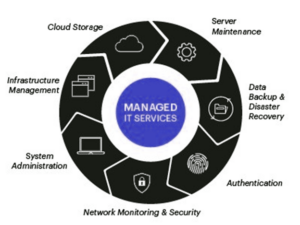Tired of dealing with relentless IT issues in your business? Well, a managed IT service might be the one-stop solution you have been looking for! Modern businesses are built on a prepared IT infrastructure. It delivers customers the computing foundation that is essential to be independent and execute essential business applications, including network, workplace and data infrastructure. Ultimately, simplifying IT management with a specialist will accelerate your business processes.
Overview of Managed IT Infrastructure Services
Primarily, managed IT infrastructure services refer to the outsourcing of the management, monitoring and maintenance of an organisation’s IT. This IT management service enables organisations to focus on core business goals, improve operational efficiency, mitigate risks and adopt cut-edge technology.


Key Elements of Managed IT Infrastructure Services
- Service provider ensures network availability, network management, and security.
- Managed IT support provider manages cloud services, often including cloud infrastructure, resources and application management.
- Managed service provider (MSP) monitors and supports servers and storage systems.
- To ensure data security, managed service providers put backup systems, conduct backups, and create recovery plans.
- MSP includes help desk support service, which aid in incident resolution, troubleshooting problems and supplying client aid.
- Managed infrastructure service includes monitoring and optimising IT infrastructure components for best performance and identifying issues.
- Information and communication technologies (ICT) is a tool used by the host to deliver effective services to their clients, such as transmitting, storing, creating, sharing, or exchanging information.
Consequences of having an unmanaged IT infrastructure
Having an unmanaged IT Infrastructure alerts many challenges that can hinder the operations and efficiency of a business. Read ahead to understand the issues the business environment will face with an unmanaged IT framework.
One of the challenges is inadequate infrastructure creates a lot of complications, such as unhappy customers and damaging the brand’s image. Further, failure to keep up with software updates, security patches, and access controls may lead to the exposure of sensitive data, resulting in serious financial and legal consequences.
Companies are bound to experience hardware failures, software glitches and network issues consuming the full attention of the IT team along with business operations disruption. A lack of supervision in an information technology framework can cause a lack of visibility into resource usage and optimisation, leading to resource wastage and increased costs.
Without an effective IT management strategy, companies may lose out on opportunities to expand and improve their digital capabilities. Therefore, it is critical for businesses to invest in IT management infrastructure to prevent these negative consequences.
Perks of Managed IT Services
Managing the facilities of your network, systems, and applications is essential to increase the productivity of your business and better your IT infrastructure. Thus, a well-managed IT provider can help all kinds of businesses. Here is a list of benefits you can enjoy offered by an IT infrastructure management provider.
1. Access to Expertise and Specialised Skills
With the help of managed IT providers, you can take advantage of various innovative technologies and benefit from their ability. They bring the latest and most innovative solutions to the table, making it easy for you to stay up to date. You can receive expert guidance and strategic insights for the implementation of the latest solutions to reduce risks.
2. Proactive Monitoring and Maintenance
IT management provider uses advanced infrastructure monitoring tools to ensure minimal system downtime and the best availability. By using real-time observation, individuals and organizations can effectively track their system’s performance, find potential issues, and proactively prevent them from escalating into major problems. Additionally, this approach enables prompt detection of suspicious activities, intrusions, or malware infections, resulting in swift response and effective mitigation.
3. Enhance Scalability and Flexibility
All businesses can stay agile and adapt quickly to changing needs. This means having the flexibility to scale up or down your IT resources on-demand without any hassle. So, whether you are experiencing growth, seasonal fluctuations, or any other shifts in your business, you can count on your high infrastructure performance to keep up with the pace.
4. Cost Saving and Predictable Budgeting
One of the significant advantages of IT management service is you get to perfect your cost by predictable budgeting. Companies can save money by using providers of managed IT services, as it reduces the requirement of buying and keeping costly hardware, software, and infrastructure. By choosing a cost-effective subscription with managed IT service providers, you can save money on costly infrastructure design and the maintenance of an in-house IT team.
5. Enhancing Security and Data protection
Secure your critical data and systems with proactive support from managed infrastructure providers to guard against cyber threats and data breaches. They implement robust security measures such as firewalls, intrusion detection systems and data encryption to safeguard sensitive information from threats. Working with a team of experts, you will never have to worry about losing your data with their reliable backup and disaster recovery solutions.
6. Reduce downtime with high reliability
Managed IT infrastructure providers offer 24/7 round-the-clock service desk, performance monitoring and maintenance, ensuring that all IT issues are resolved promptly. Vendors for IT infrastructure can guarantee their clients an uninterrupted and reliable service by offering high availability and redundancy. This ensures that your business can run smoothly without worrying about sudden disruptions or downtime.
7. Focus on Core Business Objectives
With the responsibility of day-to-day IT operations management handled by managed IT service providers, internal IT teams can distribute more time and resources to strategic initiatives, innovation and supporting business growth. Your vendor’s top priority is to guarantee the seamless operation of your IT systems, enabling your employees to concentrate on their primary duties.
Components of IT infrastructure managed services
With numerous component conjunctions that provide full support and control of the business IT framework, you can optimise your company’s IT infrastructure throughout its lifecycle. Read further to discover more about its components.
- Network Management: They cover tasks such as network monitoring, configuration management, security management and performance optimisation.
- Server Management: Includes tasks such as server provisioning, patch management, software installation, resource allocation, backup & recovery and virtualisation.
- Storage Management: They specialize in managing storage solutions such as Storage Area Networks (SAN), Network Attached Storage (NAS), and Cloud storage. Duties include capacity planning, ensuring data integrity and security, and data backup and replication.
- Cloud Management: Addresses cloud-based infrastructure, whether it is a public, private, or hybrid cloud environment. Covers tasks such as workload migration cost optimisation, security management and compliance adherence.
- Security Management: They are involved in managing confidentiality, the integrity of IT systems, data security policy development, access control management, vulnerability scanning and security incident response.
- Data Center Management: They handle tasks such as holistic data Center design & layout, power & cooling management, keeping track of equipment and physical security management.
- End-User-Device Management: Vendors revolve around the management of end-user devices, which include desktop, mobile, and so on. Holding tasks like device provisioning, deploying software, full visibility on assets tracking and remote access management.
Which is better, outsourced or In-House IT Support?
Outsourcing IT support means hiring a third-party organisation on a contractual basis to handle IT services or job functions for a company. This helps businesses reduce costs, gain access to specialised expertise, and focus on core activities while delegating IT responsibilities to external providers.
Click for more: Pros and Cons of Outsourcing Managed IT support service
When a company hires and employs IT workers within its ranks to manage its technical needs and provide support, this is known as in-house IT support. The organisation has a dedicated IT department of specialists who handle tasks like supporting computer systems, resolving technical issues, managing user requests and performing software installations and hardware configurations.
Whether to deploy or have on-premises IT support is a crucial decision for any business. Both options have their pros and cons, and what is best for your business depends on your unique needs and circumstances. Ultimately, the business must assess what approach aligns best with its needs.
Choosing the Right Provider of IT Management Services.
When selecting the appropriate provider of IT management services, it is crucial to consider several factors to ensure the best fit for your company. Let me share with you some key points that will help guide you through it.
- Assess your business IT requirements, such as infrastructure size, complexity, scalability needs and desired service level.
- Evaluate the range of services offered by different providers and look for a specialist that aligns with your business needs.
- Look for providers that offer robust tracking proficiency and redundancy measures and guarantee high uptime and responsiveness.
- It would be wise to ask about their security measures, certifications, and protocols for responding to incidents.
- Consider both upfront and ongoing expenses to balance the cost with value and rewards ensured by the provider.
- Effective communication is a key aspect of any successful partnership. It is essential to evaluate their customer support proficiency to ensure a fruitful collaboration.
- Finally, seek references and reviews which will provide valuable insights into the provider’s performance, reliability, and satisfaction.
You might also enjoy: Finding the Right Local IT Support Services for Your Business
Manage Your IT Infrastructure with NSW IT Support!
Looking for reliable IT infrastructure management for your organisation? NSW IT Support has got you covered! At NSW IT, we provide high-quality and scalable system supervision specifically tailored to meet the unique needs of your business.
If you want the best business performance, fully managed IT infrastructure is essential to effectively oversee policies, processes, equipment, data, and human resources. Contact us to maximise your IT investment and help manage your IT needs with our expert consultant and engineer, so you can focus on what you do best.







